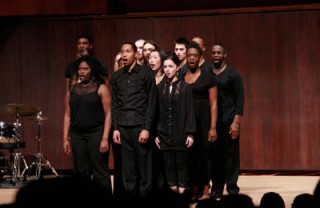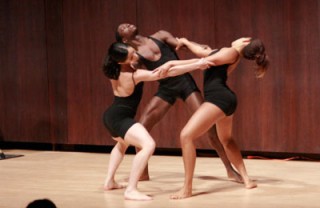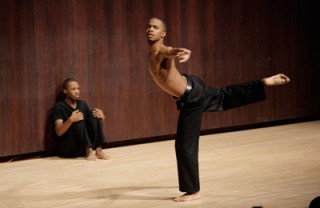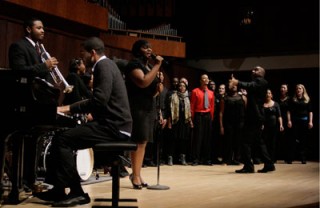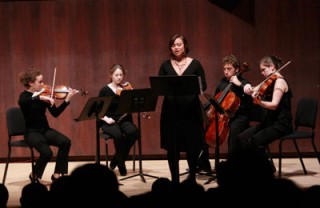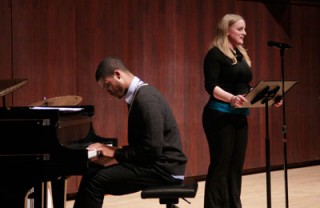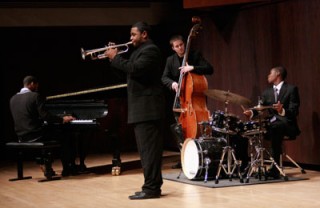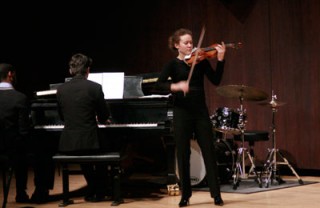 M.L.K. 2009: A Legacy of Hope
M.L.K. 2009: A Legacy of Hope Juilliard in Aiken Festival a Success
Juilliard in Aiken Festival a Success Illuminating Shakespeare Rep
Illuminating Shakespeare Rep M.L.K. 20: Dr. King's Message in Words, Dance, and Song
M.L.K. 20: Dr. King's Message in Words, Dance, and Song Celebrating the Life of an Extraordinary Musician
Celebrating the Life of an Extraordinary Musician Orientation Provides a Warm 'Welcome!' for New Students
Orientation Provides a Warm 'Welcome!' for New Students Recent Events for April 2010
Recent Events for April 2010 Recent Events for March 2012
Recent Events for March 2012 Recent Events for February 2012
Recent Events for February 2012 Recent Events for December 2011-January 2012
Recent Events for December 2011-January 2012 Recent Events for November 2011
Recent Events for November 2011 Recent Events for October 2011
Recent Events for October 2011 Recent Events for September 2011
Recent Events for September 2011 Recent Events for April 2011
Recent Events for April 2011 Recent Events for March 2011
Recent Events for March 2011 Recent Events for February 2011
Recent Events for February 2011 Recent Events for March 2010
Recent Events for March 2010 Recent Events for December 2009-January 2010
Recent Events for December 2009-January 2010 Recent Events for November 2009
Recent Events for November 2009 Recent Events for October 2009
Recent Events for October 2009 Recent Events for September 2009
Recent Events for September 2009 Recent Events for April 2009
Recent Events for April 2009 Recent Events for May 2017
Recent Events for May 2017 Recent Events for April 2017
Recent Events for April 2017 Recent Events for March 2017
Recent Events for March 2017 Recent Events for February 2017
Recent Events for February 2017 Recent Events Dec. 2016-Jan. 2017
Recent Events Dec. 2016-Jan. 2017 Choreographers and Composers Create
Choreographers and Composers Create Recent Events November 2016
Recent Events November 2016 Orientation and Convocation 2016
Orientation and Convocation 2016 Recent Events for September 2016
Recent Events for September 2016 Recent Events for May 2016
Recent Events for May 2016 Recent Events for April 2016
Recent Events for April 2016 Recent Events for March 2016
Recent Events for March 2016 Recent Events for February 2016
Recent Events for February 2016 Recent Events for December-January 2015-16
Recent Events for December-January 2015-16 Rehearsing Yasmina Reza’s 'God of Carnage'
Rehearsing Yasmina Reza’s 'God of Carnage' Recent Events for November 2015
Recent Events for November 2015 Recent Events for October 2015
Recent Events for October 2015 Recent Events for September 2015
Recent Events for September 2015 Juilliard Celebrates the Class of 2015
Juilliard Celebrates the Class of 2015 Recent Events for May 2015
Recent Events for May 2015 Recent Events for April 2015
Recent Events for April 2015 Recent Events for March 2015
Recent Events for March 2015 Recent Events for February 2015
Recent Events for February 2015 Third-Years' "The Frogs"
Third-Years' "The Frogs" Recent Events for December 2014
Recent Events for December 2014 Recent Events for November 2014
Recent Events for November 2014 Recent Events for October 2014
Recent Events for October 2014 Recent Events for September 2014
Recent Events for September 2014 Juilliard Celebrates 109th Commencement
Juilliard Celebrates 109th Commencement Highlights of 2013-14 in Pictures
Highlights of 2013-14 in Pictures Recent Events for April 2014
Recent Events for April 2014 Recent Events for March 2014
Recent Events for March 2014 Recent Events for February 2014
Recent Events for February 2014 Alumni Recent Events
Alumni Recent Events Recent Events for December 2013-January 2014
Recent Events for December 2013-January 2014 Recent Events for November 2013
Recent Events for November 2013 Recent Events for October 2013
Recent Events for October 2013 Recent Events for September 2013
Recent Events for September 2013 2012-13: A Year in Pictures
2012-13: A Year in Pictures Recent Events for April 2013
Recent Events for April 2013 Recent Events for November 2012
Recent Events for November 2012 Rebuilding Ground Zero
Rebuilding Ground Zero Recent Events for March 2013
Recent Events for March 2013 25 Years of M.L.K. at Juilliard
25 Years of M.L.K. at Juilliard Recent Alumni Events 2013
Recent Alumni Events 2013 Recent Events for October 2012
Recent Events for October 2012 Recent Events for December 2012-January 2013
Recent Events for December 2012-January 2013 Superstorm Sandy: The Aftermath
Superstorm Sandy: The Aftermath Recent Events for February 2013
Recent Events for February 2013 Rebuilding Ground Zero
Rebuilding Ground Zero Recent Events for December 2010/January 2011
Recent Events for December 2010/January 2011 Recent Events for April 2012
Recent Events for April 2012 Recent Events for September 2010
Recent Events for September 2010 Recent Events for November 2010
Recent Events for November 2010 Looking Back at 2008-2009
Looking Back at 2008-2009 Looking Back at 2009-2010
Looking Back at 2009-2010 2010-2011: A Year in Pictures
2010-2011: A Year in Pictures 2011-12: A Year in Pictures
2011-12: A Year in Pictures Recent Events for September 2012
Recent Events for September 2012 Summer Jazz Camps Serve 300 Young Students
Summer Jazz Camps Serve 300 Young Students Recent Events for December 2010
Recent Events for December 2010 Recent Events for November for 2010
Recent Events for November for 2010 Recent Events for October 2010
Recent Events for October 2010 Recent Events for February 2010
Recent Events for February 2010 In New Orleans, Students Lend Hands, Hearts, and Minds
In New Orleans, Students Lend Hands, Hearts, and Minds Alumni Recent Events 2009
Alumni Recent Events 2009 At Orientation, Frolic and New Friendships
At Orientation, Frolic and New Friendships Settling In: New Students Arrive and Thrive
Settling In: New Students Arrive and Thrive Summer Dance Intensive 2011: Energy, Rigor, Commitment
Summer Dance Intensive 2011: Energy, Rigor, Commitment Commencement 2011: John Adams Addresses the Newest...
Commencement 2011: John Adams Addresses the Newest... Building in the Big Easy: ARTreach New Orleans Turns 5
Building in the Big Easy: ARTreach New Orleans Turns 5 Recent Alumni Events 2011
Recent Alumni Events 2011 New Students Get Acquainted and Explore the Big Apple
New Students Get Acquainted and Explore the Big Apple Alumni Reconnect
Alumni Reconnect Joseph W. Polisi: 25 Years in Pictures
Joseph W. Polisi: 25 Years in Pictures Elliott Carter at 99
Elliott Carter at 99 Gala Celebrates 25th Anniversary of Polisi Presidency
Gala Celebrates 25th Anniversary of Polisi Presidency Celebrating the Legacy of M.L.K.: Why We Can’t Wait
Celebrating the Legacy of M.L.K.: Why We Can’t Wait
The Juilliard community assembled in Paul Recital Hall—as it does each year—to celebrate the life of Dr. Martin Luther King Jr. with a student-produced performance on January 19 that examined Dr. King's legacy through an honest look at past struggles, promising realities, and the wide-open plain of the future. This year's celebration, titled A Legacy of Hope, took place in uncanny juxtaposition with the following day's inauguration of President Barack Obama—a hard-earned and timely illustration of Dr. King's dream.
Directed by Juilliard alumna Rosemary K. Andress, the performance proved to be a stunning display of students' talents crossing disciplinary boundaries. Drama majors moved, dance majors sang, jazz majors directed choirs and spoke eloquently.
Launching the evening on a solemn and sacred note, pianist Kris Bowers played "We Shall Overcome" as images of war, violence, and intolerance were projected onto a large screen. Jehbreal Muhammad entered and sang "The Star-Spangled Banner" as the piano and photo montage continued. An upbeat dialogue between spoken word and tap dance followed as Grantham Coleman and Zach Villa used their respective mediums to examine the ideals, dreams, and progress of both the audience and themselves.
Musical performances included those of soprano Faylotte Crayton singing Sancta Maria with a string quartet, a work by composition student Simon Frisch based on a poem by Edgar Allen Poe. Violinist Robin Quinnett collaborated with Frisch as pianist in Mother and Child, by African-American composer William Grant Still. At various points in the evening, a dramatic ensemble spoke excerpts from speeches of Dr. King, Abraham Lincoln, Michelle Obama, and Barack Obama, moving interpretively in unison.
Other highlights included a jazz ensemble's playful rendition of "I'm Beginning to See the Light" and two dance works choreographed by LeBaron McClary and Hassan Ingraham. Both pieces of choreography demonstrated the patience, pain, and optimism of Dr. King's struggle for civil rights and how it has played out in our own lives.
Jazz trombonist Melissa Jean candidly spoke about her deeply personal experiences with affirmative action, immigration, racial profiling, and interracial relationships. Drawing from what she has encountered as a white woman married to a black Haitian immigrant, she provided unique insight into another aspect of Dr. King's dream.
Ending on an emotional note, the entire cast sang "I Know Where I've Been," featuring a powerful vocal solo by drama student Stacey Scott, signaling that Dr. King's legacy has not been forgotten, but that the dream has been built upon and revived.
Courtney Blackwell, Director of Career Services

